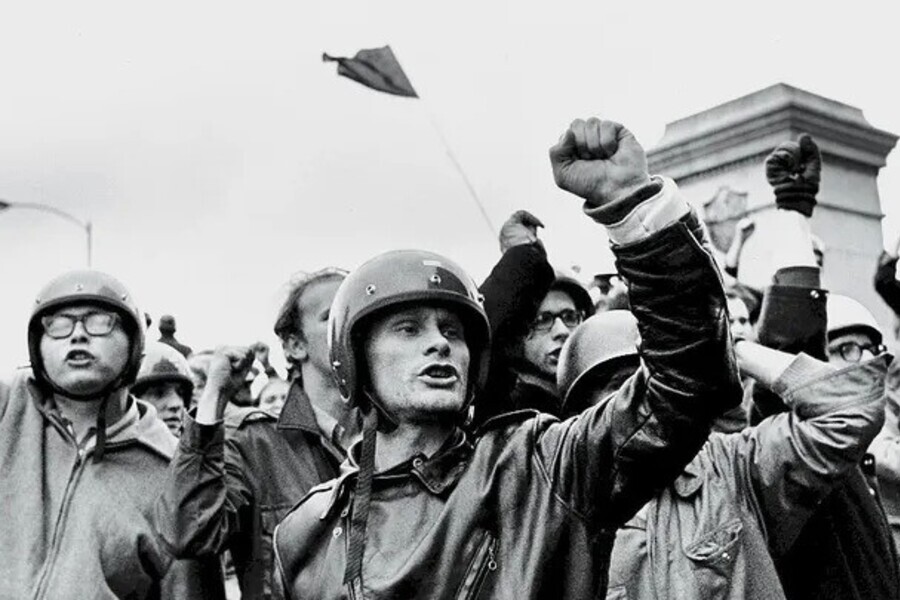
Northwestern University has recently navigated a delicate agreement to quell the ongoing anti-Israel protests on its campus, a decision that arrives amid broader national unrest on college campuses.
The university, located in Chicago, announced this past Monday its decision to reinstate an advisory committee on university investments among other commitments.
This move seeks to strike a balance between maintaining campus order and respecting the rights of students to voice their concerns, particularly regarding the war in Gaza.
However, the agreement also shines a light on a more controversial aspect of Northwestern’s community—Zayd Ayers Dohrn, a professor whose parents were notorious figures in the radical Weather Underground organization.
Dohrn’s connection to his radical lineage not only adds layers to the current campus discourse but also brings historical political activism into contemporary debates.
Background
The Weather Underground, a militant group active during the tumultuous late 1960s and 1970s, was notorious for its aggressive opposition to the U.S. government. Its members, driven by a fervent anti-war and radical leftist ideology, engaged in a series of bombings targeting high-profile government structures such as the Pentagon and the U.S. Capitol.
These actions were intended as political statements against the Vietnam War and perceived injustices by the U.S. government. At the heart of this group were leaders like Bernardine Rae Dohrn and Bill Ayers, who not only orchestrated these attacks but also became symbols of radical resistance during that era.
Their son, Zayd Ayers Dohrn, currently serves as a faculty member in the Department of Radio/Television/Film at Northwestern University and directs the MFA in Writing for Screen and Stage. Unlike many who might seek to distance themselves from such a controversial lineage, Dohrn has chosen to lean into his unique personal history through his academic and creative pursuits.
His podcast, “Mother Country Radicals,” offers a profound exploration of his upbringing amidst radical political activism, providing insight into the complexities of being raised by figures who were both deeply loved as parents and widely vilified as public enemies.
This personal narrative adds a rich, albeit complex, layer to Dohrn’s role within a university currently navigating its challenges with campus activism and protest. His presence on campus as both a descendant and chronicler of radical history inevitably influences discussions around academic freedom and the boundaries of political expression.
It also raises pertinent questions about the extent to which personal backgrounds should impact professional roles in academia, especially in disciplines that intersect closely with social and political commentary.
Moreover, Dohrn’s transparency about his background and his active engagement with it through his work underscores a broader discourse on the reconciliation of past militancy with present-day academic and cultural contexts. This discourse is particularly relevant when universities across the nation are grappling with issues of free speech, historical legacy, and the role of education in shaping societal values.
As such, Zayd Ayers Dohrn’s position at Northwestern not only highlights the continuing impact of historical political movements on current events but also exemplifies the ongoing struggle to balance personal history with professional responsibilities in a constantly evolving academic landscape.
Under the terms of the new agreement, Northwestern has set conditions to manage protest activities more strictly. The university will allow only one tent for aid supplies on campus and requires school permission for loudspeaker use.
Importantly, the agreement restricts protest participation to individuals with direct ties to the university and includes penalties for non-compliance, such as suspension.
This approach mirrors actions taken by other institutions like Brown University, which have sought similar compromises in response to campus disruptions.
These measures are part of a larger effort to ensure that universities can maintain a safe and conducive learning environment while still allowing room for political expression and activism.
Reaction from Different Sides
The agreement has not been without its critics. Some proponents of Israel have labeled the university’s actions as a capitulation, suggesting that Northwestern is giving in too easily to protester demands. Conversely, several student organizers have expressed disappointment, viewing the agreement as a dilution of their original goals.
These divergent views highlight the complex balancing act that universities like Northwestern face in managing campus unrest. The challenge lies in addressing the concerns of all parties while ensuring that the institution’s educational mission is not compromised.
Implications for Academic Freedom and Campus Politics
The involvement of a faculty member like Zayd Ayers Dohrn in this context raises significant questions about academic freedom and the role of personal history in professional settings. Dohrn’s radical pedigree, while providing a rich backdrop for academic and creative exploration, also subjects him and the university to heightened scrutiny amid current campus tensions.
This scrutiny comes at a time when academic institutions across the country are reevaluating their approaches to free speech, protest, and the inclusion of diverse perspectives on campus. How Northwestern handles this situation could set important precedents for how other universities navigate similar challenges.
As Northwestern moves forward with its agreement, the university community remains attentive to the unfolding dynamics. The administration’s ability to implement this agreement effectively and sensitively will likely influence future university policies nationwide regarding campus protests and the integration of controversial figures within academic settings.
In conclusion, Northwestern’s recent agreement represents more than just a response to immediate campus protests; it reflects ongoing debates about freedom, safety, and the role of universities in fostering societal change. As such, the university continues to be a focal point in discussions about how best to balance these complex, often competing considerations in higher education today.
The outcome at Northwestern will not only affect its campus climate but could also offer insights and models for other institutions grappling with similar issues of free expression, safety, and the legacy of historical activism in a modern academic context.




















